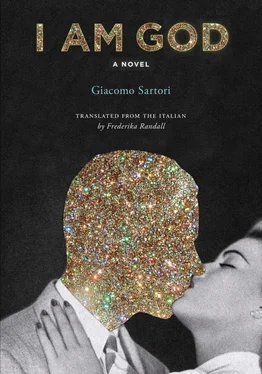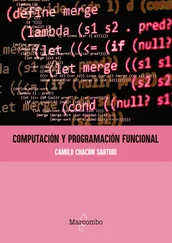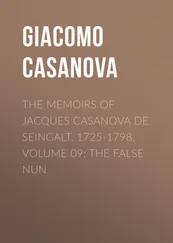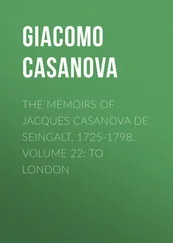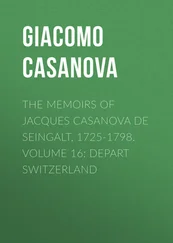Now you might think it was I who took care of this matter, too, but no, I didn’t lift a finger. The dying bishop did it. Somehow he figured out why she was there, and summoning his strength for the last time, he put through a call to a certain senator, who then called the director of the Institute (a man appointed by the senator’s own political party), and by 9 p.m. that evening, all was settled. The powerful senator and fierce opponent of gay marriage sent word to the pedophile bishop that the beanpole would be given a permanent job in a few months, because one had opened up. The bishop could no longer speak, he already had more than a foot in the tomb, but he shook his head ever so slightly. Then he shook it again to request extreme unction.
Unfortunately something very sad has happened , the director tells her as he walks her to the stairs, beating both arms in the air as if chasing away Mendelian fruit flies. The candidate to whom we offered the job was knocked down by a truck at a zebra crossing , he goes on, marshaling the usual stumps of phrases, limbs lopped off by an overzealous gardener. The doctors couldn’t say whether she would come out of the coma (yes, she will) and whether, if she did, there would be any brain injury (impossible to rule out some aftereffects), in any case she wouldn’t be returning to the job. Dreadful bad luck, the truck was actually going extremely slowly, he says, getting slightly teary again thinking how easily it could have happened to him, who’s always so distracted. God disposes, in his infinite wisdom , he sighs. I can only confirm that.
Ms. Einstein is sorry that the stupid showgirl’s in a coma, but she’s practically flying as she leaves the Institute. The force of gravity has diminished and her lungs seem full of nitrous oxide, that funny gas that pulls her lips to the sides of her mouth, making her smile. The threadbare estate which houses the institute looks beautiful today, and the blackbirds are winking at her. She’ll return to work tomorrow, she thinks. Then she reconsiders. Next Monday morning will do fine. Now that she knows she’ll have some kind of salary, even if modest, she can look for a studio apartment (she’ll find one, trust me). She certainly means to live with Aphra ( man of my life , she thinks), but right now she’d prefer to have a base in the city so that she doesn’t have to commute to and from work every day, among other things. She mounts her bike and as she rides home she’s floating on air, an archangel on the ceiling of some damn church.
Up until now, my infinite goodness has prevailed. But the time has come to extinguish them, men. Humans. As I did with dinosaurs, with mammoths, each time sweeping a goodly number of creatures off the planet. And I have no regrets. After a while you can get fed up with a species, like everything else. You want to see new faces, you need fresh air. Not to mention the fact that (wo)men are wiping out a stratospheric number of plants and animals at an ever-crazier rate. Extinguishing them will be a genuine ecological good deed. If you think about it, they are merely a single species among ten million in the animal kingdom (I disregard their unreliable estimates). The difference between 9,999,999 and 10 million changes little, I think you’ll agree. Very soon now, perhaps even as I write the final syllable of this fatal diary, I’ll pull the switch, and they’ll get what they deserve.
Yes, it will be some time before all the traces of their misdeeds disappear, but it’s important to begin. The rivers will begin to run where they desire to run, properly flooding the plains. Highways and cities will disappear under a tangle of vegetation. First moss and lichens will spread, then grasses, then mighty oaks. Trees will no longer fear being lopped off at the base, or even pruned; they’ll tower undisturbed again. In short, I trust in the vegetable world to repair things. At the most I might spread a little fertilizer—organic, of course; we’ve had enough chemistry. The skyscrapers will begin to lean like the Leaning Tower of Pisa (Pizza?), then they’ll all topple over like bowling pins. Farewell paved parking lots, high-tension lines, shopping centers, airports: the forests will rule everywhere. Above all, no more churches, those dangerous dens of hypocrisy. I can’t wait to be free of them again.
How peaceful it will be without (wo)men; I can already taste the deep serenity. No more airplanes deafening the atmosphere—and covering the sky with those unsightly trails—no more smelly industries and exhaust pipes, no more carloads of carbon dioxide. Fish will be free to tear around the sea without fear of ending up in a can, or as fish meal in a pigpen. Birds will fly where they wish, cows will stop producing that poor-quality milk and slowly relearn how to be less tame . Dogs will shed that intolerable servile air, cats will scratch and hiss again. Free competition among the species will be re-established, minus those tricks and cheap shots human beings have always imposed to their own advantage.
The only thing that could go wrong would be if a few cunning survivors were to remain hidden away in some cave or swamp. There they’d be, quiet as mice, gnawing on wild berries and lizards, awaiting better times, until they could carry out one of their demographic explosions, a skill they’re unequaled at, lying low the way a half-forgotten epidemic disease does, and then suddenly multiplying aggressively, like a bomb going off. I wouldn’t be at all surprised if in less than no time they’d have reinvented fire, iron blades, gunpowder, and so forth down to cell phones. So I’ll be keeping an eye trained to be sure not even the tiniest pocket of resistance survives. If necessary, I’ll employ a powerful volcano, one of those emitting cinders of lava that darken the sky for several years, a Pompeii 2.0. I have no intention of repeating this foolish comedy.
Come to think of it, the best solution might be to give Andromeda a push, like you do a child on a swing, to speed her up. The apocalyptic collision is predicted in two billion years? How about if I make that two minutes? Bye-bye Milky Way, no more pointless constellation-gazing. One must never hesitate to think big. Or should I decide something subtler is in order, I could revive the appetite of Sagittarius A* so that stars gravitating nearby, such as the Sun, are drawn inside. I can see that hideous mouth of his sucking in the various stars, a celestial Polyphemus gobbling down Ulysses’ men. But this time there’ll be no Ulysses to outwit him, no more cunning, no more (human) words. I’ll think about it, and then I’ll decide. Or rather, I won’t think, the right choice will simply impose itself. I am God , as I said. And that’s it from me.
The novelist, poet, and dramatist GIACOMO SARTORI was born in 1958 in Trento in the Alpine northeast of Italy near the Austrian border. An agronomist, he is a soil specialist whose unusual day job (unusual for a writer) has shaped a distinctive concrete and poetic literary style. He has worked abroad with international development agencies in a number of countries, and has taught at the University of Trento. He was over 30 when he began writing, and has since published seven novels and four collections of stories as well as poetry and texts for the stage. He is an editor of the literary collective Nazione Indiana and contributes to the blog www.nazioneindiana.com.
Sartori took as his subject in his early novels Tritolo ( TNT ) and Sacrificio ( Sacrifice ) the stifling provincial atmosphere of the valleys of his native region and the twisted lives of its most vulnerable inhabitants. A recent novel Rogo ( At the Stake ), also set in the region, is written in the voices of three women from different historical periods who commit infanticide. The autofiction Anatomia della battaglia ( The Anatomy of the Battle ) about a young man’s effort to come to terms with and define his manhood against the model of his father, a committed Fascist, and the historical novel Cielo nero ( Black Heavens ), deal with fascism and its dark, persistent allure. Sartori’s shorter fiction includes the book of interrelated absurdist stories Autismi ( Autisms , 2018) written in the voice of a person struggling to cope with the bizarre, baffling customs and expectations that all around him seem to share. The black humor and pessimism are reminiscent of Samuel Beckett. Several stories from Autismi have appeared in Frederika Randall’s English translation in Massachusetts Review , and an excerpt from L’Anatomia della battaglia , also translated by Randall, appeared in The Arkansas International no. 2. At present Sartori lives between Paris and Trento.
Читать дальше
